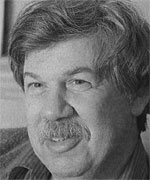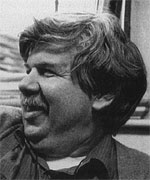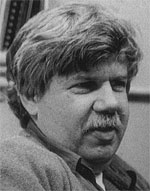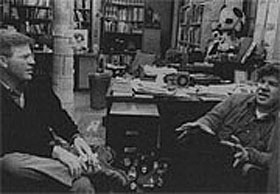Interview: Stephen Jay Gould

Stephen Jay Gould is one of those rare scientists who become widely known to the general public through popular writing. His monthly columns in Natural History and his many best-selling books, including Wonderful Life (Norton, 1989) and Bully for Brontosaurus (Norton, 1991), have turned hundreds of thousands of readers into biology fans. Many of Dr. Gould's essays highlight the role of chance in the history of life. He is also well known for the theory of punctuated equilibrium, which he developed with fellow paleontologist Niles Eldredge of the American Museum of Natural History. Stephen Jay Gould teaches biology, geology, and the history of science at Harvard.
How did your interest in fossils develop?
There are two paths for kids who get into it young, which I did. One is you live rurally and you collect fossils, and the other is you live in an urban setting and you go to museums. I grew up in New York, so for me it was the Museum of Natural History.
At what age?
Five or six. But this situation is common. Maybe what's rare is that within the profession you find so many people who have been committed to it ever since they were kids, because that's when many people first get interested in fossils. Among paleontologists you find a lot who have been at it since they were little.
If so many kids are interested in fossils, why aren't there more paleontologists?
Well, first of all, they don't ever really get into the intellectually interesting part of it; for them it's just a transient stage. From that they go onto the policeman or the fireman stage, or the Ninja turtle stage, or whatever is next. I don't mean to say that condescendingly; that's what kids do. There are a lot of interests that are meant to be sampled, and then you pass on to something else. You'll be very fascinated with something and learn a little bit about it, and then you move on. And so you lose a lot there, and that's fine, that's how a kid has to grow up. I'm not being at all critical. The ones I'm sad about are the ones you lose because their parents don't encourage it, or because it isn't cool on the playground, or because they're poor and don't get a chance for an education, or because their parents persuade them it's not remunerative. And that's too bad.
What motivated you to start writing for general audiences?
My first Natural History piece was a regular article, and then I started the series in January 1974. It was never an intention. It's like most things in the evolution of life, to use an analogy: it just happened. They'd always had columns. They asked me because I had done my graduate work at the Museum of Natural History, and I already had a reputation for writing technical scientific papers in a style that was very unconventional and fairly literary. When they asked me, I thought, "There's a funny idea," and I thought I'd do two or three and see what happened. That was 210 essays ago. It just happened. I tried it and I liked it, as the saying goes. And I still do it.

Several of your essays address the fallacy of searching for moral messages in nature. Why doesn't this work?
The very worst example ever was, of course, Adolf Hitler building a theory of racial purity on what he thought was the way in which nature operated. The fact that his ideas were nonsensical doesn't mean the notion is valid that you can find good morals in nature. The main point is that life is 3.5 billion years old and we got here yesterday, geologically speaking. Why should a process that's been going on that long in ignorance of us contain moral messages for our lives? It can't. Science as an enterprise is a discipline that deals with the factual state of the world, and you don't derive ethical beliefs from factual statements. The most science can do is to supply information that may be relevant to ethical decisions, but it's never going to tell you what the proper behavior is. It just can't.
Another common theme in your essays is how cultural and social biases affect our view of life. Can you give an example?
Anything is an example because science is inevitably embedded in social context. Because I'm an evolutionary biologist, from my point of view the most interesting cases are biases that we have that distort our interpretation of evolution. Some are very general, some very deep biases like determinism, which don't really hold in the world. But in respect to the interpretation of evolution, surely the most pervasive bias is the various ways in which people still want to see themselves as the top of some evolutionary ladder rather than as one branch on a very elaborate bush of life. The old notion of progress, of evolution as an advancing, "complexifying" force that leads to human beings, is probably still the strongest bias affecting the way that people look at evolution.
You have also pointed out that our view of nature is biased by a provincial sense of scale: our use of human body size and human lifespan as measuring rods. How do scaling problems contribute to misconceptions about life?
The range of time is so vast and the human life is about 70 years, if you're lucky. To a geologist, 70 years is so short you couldn't even measure it. We think of things as long if they last most of a 70-year lifetime, but that's an immeasurable geological instant. People get messed up on concepts of time. When I developed the punctuated equilibrium theory with Niles Eldredge, it was misinterpreted because we kept saying that new species arise with geological abruptness, and people thought we meant overnight in a single macromutation. In fact, we meant 5,000 to 10,000 years, which would be glacially slow on the scale of a human life, but is instantaneous geologically. People just don't understand the scale differences.
Size might not be so big a problem except that the forces of nature are different on organisms of very different sizes. Because we're fascinated by the few animals that are larger than we are, most people think that humans are kind of in-between in the range of organic size. It's not true. We're at the very upper end. We must be in the highest half a percent of body size for animals. We're big. There aren't many animals that are bigger than us. The vast majority, about 80%, are arthropods, and they're all tiny compared to us. Because in the world of small creatures surface forces predominate, and in our world volumetric and gravitational forces predominate, we just don't realize that small animals are experiencing a different world. The most amusing examples are the science fiction films that completely mess that up. The giant insect films where they have 20-foot ants flying — well, a 20-foot ant couldn't fly because flight is surface dependent and much of liftup is volumetric. It just couldn't do it.
Besides the time-scale issue, are there other reasons that punctuated equilibrium is still controversial among biologists?
Part of it is misunderstanding based on scale. But a lot of it is the deep preference that people have for gradualistic explanations. There is a reason why gradualism is preferred in Darwinian theory, which is that if you're going to ascribe change entirely to natural selection building adaptation, then the adaptation has to be built slowly and gradually, step by step. Otherwise how can natural selection be behind it? For selection to be a creative force in evolutionary change, it has to select from a random field of variation and build a direction itself, and it has to do that through intermediary stages. Hence the strong preference for gradualism.

Your 1989 book, Wonderful Life, is about the role of contingency in the history of life. What's a good example?
The best example, the one that strikes home closest, is all of us. What are we doing here anyway? A cardinal fact in the history of life is that mammals arose at the same time as dinosaurs. Most people think that mammals came late and pushed the dinosaurs out by superiority, but it's not true. The mammals and the dinosaurs arose pretty much at the same time and for a hundred million years dinosaurs were big creatures that usurped all the space for large organisms. The largest mammals before the extinction of dinosaurs were about rat size. The smallest dinosaur, which was about ostrich size, was much larger than the largest mammal.
Mammals were doing fine in their little world, but you never would have gotten intelligent creatures at this size. It wasn't until dinosaurs died out that mammals got a chance. And the dinosaurs dying was part of a mass extinction that was probably at least triggered by the impact of some extraterrestrial body. Now if that isn't the ultimately contingent, unpredictable event, I don't know what is. It's a bolt from the blue in the literal sense of the term. And it's only because that happened that mammals got a chance to differentiate.
Dinosaurs had ruled for a hundred million years; there's only been 65 million years since they died out. If it hadn't been for that event that knocked them out, I suspect they'd still be the big ones. They weren't moving towards intelligence, probably couldn't, given the nature of their construction, so we wouldn't be here. So in a very direct way, we're here because of that unanticipated extinction of dinosaurs.
But even that doesn't make human beings; it just makes mammals. Why have primates at all? Primates are a small group, only 200 species, not a conspicuously successful group. We're lucky to be here. If it weren't for a marked change in African environments 2.5 million years ago that produced savannas and reduction of forests, we'd probably still be in the trees and not sentient in the sense we are now. Contingency doesn't just apply to the big changes; it is equally strong for detail of life's history, and we're a detail.
Is there anything predictable about the course of evolution?
Yes, but the predictions are very broad ones. I'd certainly be willing to predict that life would arise given Earth conditions. That's probably a basic result of chemistry and the physics of self-organizing systems. I would grant you that there are always going to be more prey than predators because there's just no other way to run an ecosystem. I might even give you bilateral symmetry because that's an effective form. I will allow you that if flying things are going to evolve at all, they're likely to have wings because there's no other way to move through air. So there are certain very broad features of life that have predictability.
But what most people want to know about when they ask about the history of life are not such broad-scale, abstract questions. What we're usually interested in is why people are here. Why did the dinosaurs rule? Why did mammals take over? Questions like that are all in the domain of contingency.
By whatever contingency, we are here. Many students ask if we're still evolving.
I've never given a talk where that question is not asked. My question is why everyone anticipates that it should be going on. For a highly successful species like Homo sapiens, we should expect stability. So why is there always the assumption that humans will keep on changing? Why do people think it's peculiar to human beings that we haven't changed for 40 or 50 thousand years (which we haven't)? The assumption is always made that this is anomalous. It isn't. It's the standard, it's what evolution is about. Large, successful species don't change for long periods of time. Pigeons, rats, whatever it is, they just hang in there.
The question is asked because of the idea of progress. Most people think that evolution means progress. They think people are the best and they hope that evolution will mean we are going to get better. But if people understood what evolution really meant, which is adaptation to change in local environments, they would see the high level of worldwide success of human beings.
Can you envision any circumstances that would lead to the origin of new hominid species?
Oh, yes, but they're science fiction things like sending off little colonies into space somewhere. That's where you get speciation, where you get isolation of small groups. But that's truly science fiction. I like science fiction as a genre. It's just not what I do.
You mentioned the mass extinction that wiped out dinosaurs and many other forms 65 million years ago. How does that rank compared to other mass extinctions?

All paleontologists are probably agreed that there are five really large extinctions that stand out. I don't know the exact ranking, but by far the biggest is the one at the end of the Permian, 225 million years ago. The estimates for that mass extinction range as high as 96% of all marine invertebrate species. The other four came at the end of the Ordovician, of the Triassic, and of the Cretaceous, and the one that came near the top of the Devonian. The one that most people care about because it wiped out dinosaurs and gave us a chance, the Cretaceous extinction, is not the biggest; it's third or fourth.
Extinction is a subject of much interest these days. Have you encountered this argument: If extinction is the inevitable fate of every species, then why should we worry so much about current extinctions caused by human activity?
Yes, that's a standard form of developers' arguments, and a specious one. Saying that is as foolish as saying that you shouldn't cure an easily treatable childhood infection because that child will ultimately die as an old person. Yes, species die eventually, but if it's millions of years down the road, why should we dispense with them now when the reason for their death is our rapacious activities and nothing due to their natural or inevitable state?
Other than mass extinctions, what were some of the most important episodes in the history of life?
There is so much else that happened that's very interesting but isn't actually an episode because it sort of oozes in and out. There are episodes of relatively rapid origination, but they are not quite so sudden as mass extinctions. My main interest and that of almost any paleontologist is the very rapid introduction of essentially all the modern designs of multicellular life at the base of the Cambrian period some 550 million years ago, the so-called Cambrian explosion. That's really almost a facetious term, however, because geological explosions have very long fuses.
What other questions about the history of life and evolution of form are of greatest interest to you now?
Several things. I'd like to know more about the interaction of contingency and predictability and the basic pattern of life's history. I'd like to know the extent to which Darwin was right in thinking that selection working on organisms is dominant if not exclusive. I rather suspect that the hierarchical notion that selection works on species and works on genes and works on cell lineages and works on all those levels at the same time is much closer to what happens, and is actually conceptually a very different evolutionary theory from Darwinism. I'm interested in the role of random processes and mass extinctions in life's history. I'm basically interested in the way in which the very strict version of Darwinism, which has been orthodox in the last 20 or 30 years, is inadequate. I don't think it's wrong; I think it's a correct argument and that it's powerful, but I don't think it's everything, and I'm interested in those patterns of life's history that need other kinds of explanations.
If you had 30 minutes with Charles Darwin, what would you ask him?
That's a good question. First of all, I'd prepare very carefully. There would be two alternatives, depending on how open he wanted to be. First, since I've studied so much about him personally, there are some personal questions I'd like to ask that would really help us understand him: what his real reactions were about his mother's death when he was 8, and what were his personal religious feelings, which he was very cryptic about. But knowing Mr. Darwin, I don't think he'd be willing to talk about those things, and that's fine, because I wouldn't, either. I'd respect his privacy.
In that case, I'd take a second tack. I would very quickly, because we'd only have half an hour, tell him what's happened to evolutionary theory since his time, and I'd love to know what he thought of it, in the same sense that if Bach came back I'd love to show him a modern performance of his work, because I bet it would be much better than anything he heard in his own day. And I'd love to know what Darwin would think about recent discoveries in mass extinction theories, and about discoveries in heredity and molecular genetics. But probably he'd say, "You tell me, because it's so interesting; I want to know," and then my whole purpose would be defeated.
©2005 Pearson Education, Inc., publishing as Benjamin Cummings